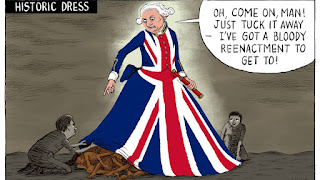Genesis 15.1-12, 17-21; Psalm 27; Philippians 3.17-4.1; Luke
13.31-35
Enemies. We all have them. And, if we
don’t have any real enemies, we make them up. Or else we paint them in more
dramatic terms than is strictly necessary. Observe, for example, what is
happening in Ukraine at present. One of the key reasons Putin has publicly offered
for invading Ukraine is that Ukraine’s national leadership has been taken over
by fascists, even ‘Nazis’, who are oppressing the people. Now, from the point
of view of the Ukrainians themselves, this seems entirely false. But from the
point of view of Putin, who has in mind the restoration of a past, mythical,
Orthodox, Russian empire, the Ukrainian leadership are indeed the evil bastards
who are keeping their people from participating in this glorious restoration.
We need to be careful
whom we call an enemy. Perhaps we should not call anyone an enemy, even if they
explicitly choose that path, and that designation, for themselves. ‘Love your
enemy,’ said Jesus in his famous sermon, ‘do good to those who hate you, bless
those who curse you, and pray for those who abuse you.’ (Luke 6.27, 28). This is really tough teaching. If your
neighbour is your enemy, what then? If you are the Ukrainian whose house is
being raided by the Russian army, what should you do? If you are an Aboriginal woman who has been
raped by a British soldier, and your children killed before your eyes, how
should you respond?
Let’s mine our lectionary
readings for some wisdom.
The Genesis story talks
about the deal or treaty YWH makes with Abram to preserve his legacy against
every threat, real or imagined. If Abram is prepared to trust his future, and
the future of his descendants to YWH, then YWH will make them prosper ‘as the stars
in the heaven’ and the land on which he stands, stretching from Egypt to the
Euphrates, will belong to them. Now, if you read this passage in its context,
there are probably both good and bad reasons for Abram to feel anxious about
himself and his clan’s future. Since arriving in that place, he’d become rich
and inclined to feel that others wanted to take what he had. The story of his
wife Sarai being given to Pharoah as a concubine is a horrific tale about the
lengths that patriarchal culture will go to fight its own paranoia about losing
wealth and influence. On the other hand, Abram also got caught up in a regional
conflict between various Canaanite city-states in which his nephew Lot was genuinely
taken into captivity.
With this background in
mind, perhaps we must conclude that the treaty between Abraham and YWH comes
about partly at God’s initiative and partly because of Abram’s male,
patriarchal paranoia about the preservation of his legacy – legacy here
understood as wealth and prestige for one’s descendents – against the indigenous
tribes of Caanan. An earlier version of the covenant (in chapter 12 of Genesis)
promises something rather different: that Abram’s descendants will become a blessing
to all nations. Not their conquerors, but a source of their blessing. Perhaps
that is what the covenant is supposed to be about, really. But this later,
Genesis 15, version seems more concerned with the ways in which the indigenous
nations, the people already there in the land to be taken by Abram’s seed, should
be seen as enemies, and therefore a threat to Abram’s patriarchal ambitions. This
is an ambiguity that has been played out in that region from the time of Abram
right through to the current conflicts between Arab and Jew in
Israel/Palestine. And, of course, there are tragic echoes of all that in what
has happened here in the colony of ‘Australia’ as well.

The writer to the
Philippians is incredibly circumspect in the way that he talks about enemies.
He says that the enemy is not so much opposed to particular people, or even to
Christ, but rather to the ‘cross of Christ’. Here the enemy is constructed not
as someone who wants to steal your possessions or kill you. The enemy is
someone who is allergic to suffering in the cause of righteousness or justice.
Indeed, this enemy’s ‘god is their stomach’, an ancient way of speaking about
the sin of gluttony or personal acquisitiveness. The sin of accumulating all
things to yourself at the expense of many others, the sin of narcissism, we
might even say. There is a sense, here, in which the writer wants, actually, to
critique the acquisitive nature of the covenant we read about in Genesis
15. Here, it is Abram who could be understood as the enemy, for he seems concerned
only about his legacy, the land he steals from others, and the prosperity of
his own family and clan. The writer to
the Philippians prefers a citizenship that is not so attached to such things,
but participates in the sufferings of Christ for the sake of a commonwealth
that is ‘in heaven’, that is, in a place and a time that has yet to arrive. In
that ‘heaven’ which – I hope you will agree, is a figure for some more hopeful
and just future – Christ will transform the humiliated bodies of all who have
suffered injustice and degradation and marginalisation, into the form of his
own glorious body. In other words, all that is wrong and unfair will be put
right. All that is broken will be restored. This is good news for all who
suffer, or who are broken and marginalised. But you have to take a leap of
faith.
Finally, in Luke’s
gospel, it is instructive to learn something about how to regard the enemy from
Christ, whose enemy is Herod, the puppet-king of the Roman occupation, who is
obviously so afraid of Christ’s teaching that he has put out a ‘hit’ on him.
Christ’s response to this news is quite extraordinary. Rather than go into
hiding, rather than gathering a militia to protect himself, what Christ does is
offer a lament over Jerusalem, a city divided against itself, a city that will
at once listen to a prophet’s preaching and honour a prophet’s office, but also,
in time, kill that prophet for speaking inconvenient or uncomfortable
words. Jesus himself, as indicated in
the final verses of this passage, will himself be welcomed by the Jerusalemites
as a prophet and even a messiah, but a week later be killed by those same
Jerusalemites. Here the enemy is within. Not the other, someone from another
group or tribe, ethnicity or religion. The enemy is your friend, your comrade,
your congregation, your synagogue, your church, your ethnic group. Those
closest to you and about whom you care the most. In the face of enemies such as
these, Christ teaches us simply to lament, which is an ancient way of naming
the evil and injustice of which we are capable, and then simply living, with
tears, in the truth of it. Here there is
no hint of revenge or strategizing towards getting the upper-hand. There is a
simple acceptance of the awful truth of the situation and a deep-down trust
that if anyone can make this better, it is certainly not ourselves. It is God
alone.
That’s kind’ve how I see
the situation here in the colony known as ‘Australia’ as well. I long ago
abandoned all hope that we, as Aboriginal and Torres Strait Islander nations,
could ever dig ourselves out of the hole we find ourselves in. We are too busy imitating
the coloniser by fighting with each other to present a united front. Although
the Uluru Statement from the Heart piques my interest. A deeply compromised and
conservative document, it yet represents the closest we have yet come to speaking
to our colonisers with one voice.
Certainly, there is
little political will towards justice from the coloniser, at least insofar as
the political class can be said to represent the will of the people.
Colonisers, and particularly the mining, forestry and agricultural companies
that continue to enjoy extraordinary levels of subsidised support from the taxpayer,
benefit enormously from our dispossession and marginalisation. And they
continue to destroy, wound, and maim country in order to make their squillions.
In my estimation, we have little to look forward to from these sectors but an
endless charitable paternalism, breadcrumbs from the imperial table.
What can the person of
faith do, then, except to be as honest and as truthful as one can be, to name
what is actually the case in the presence of the colonising powers, to lament that
it is so, and place oneself and one’s people in God’s merciful hands? In this
there is a hope, against all evidence to the contrary, that our bodies of
humiliation will one day be transformed into bodies of glory. How that might
come to be remains, for me at least, a profound mystery. But without the leap
of faith which Christian called ‘resurrection faith’ there is nothing to look
forward to at all. The last enemy, after all, is death. And its sting is fierce. Unless . . . unless God is for us, and not against us.
Notes roughly approximating a homily delivered at Koonung Heights Uniting Church on the 2nd Sunday of Lent, 2022. The live homily can be found here.
Garry Deverell


